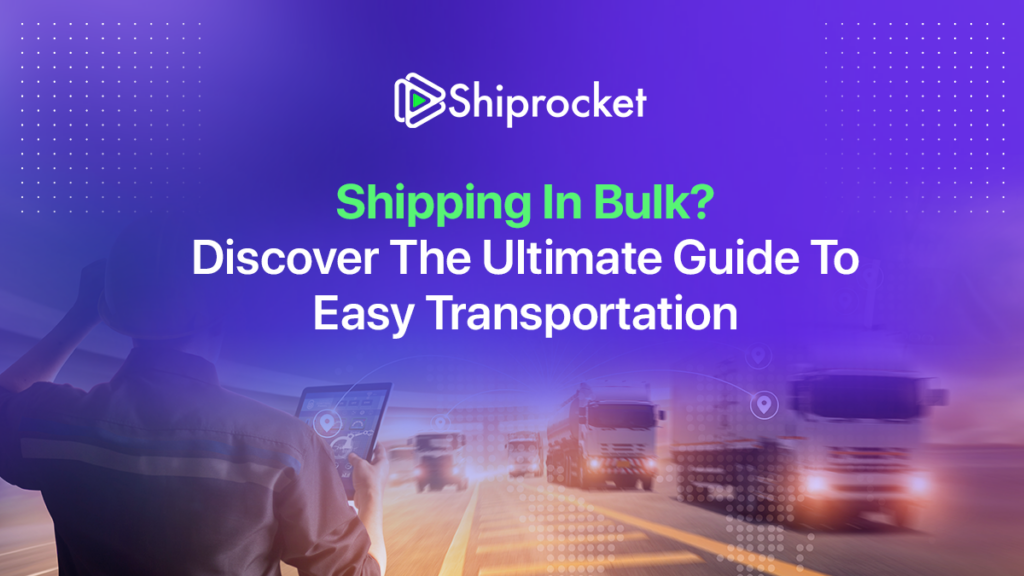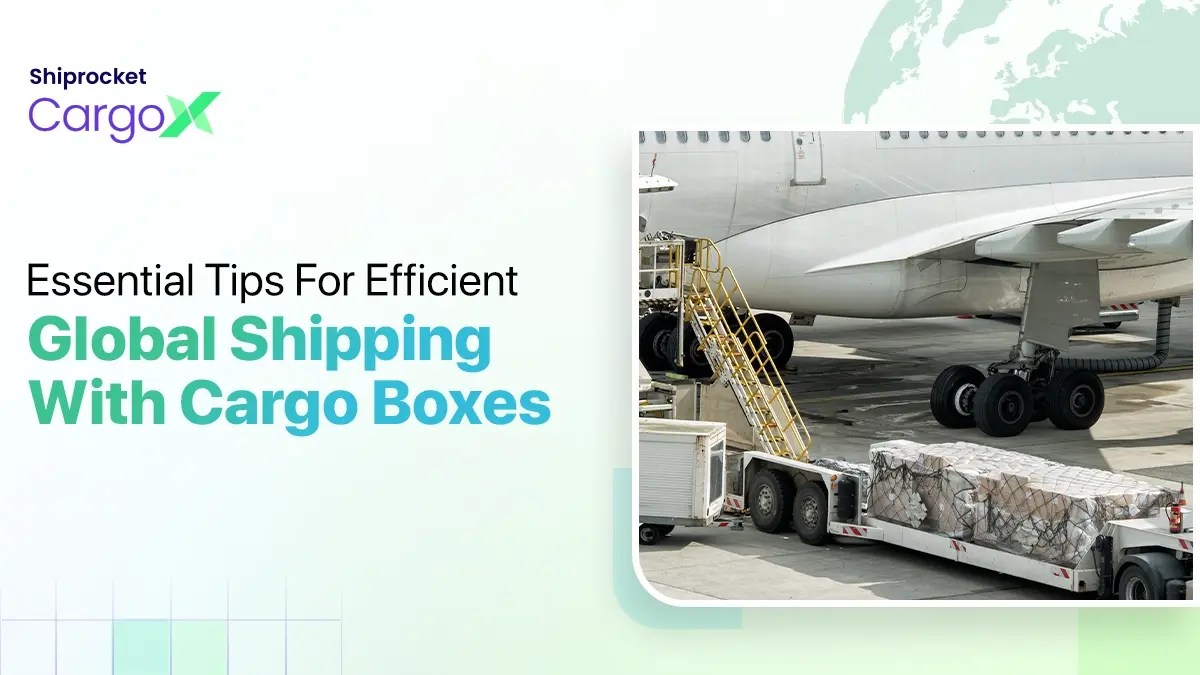Bulk Shipping Made Easy: A Guide to Hassle-free Transportation
Bulk shipping is not something new. It has been practiced for several thousand years. Everything has been shipped in bulk worldwide, from grain to coal. Bulk shipping has only gained popularity over the years. Even the art of shipping has evolved. Today, it is no longer just loading a carrier and heading toward the receiver. It has steps and sequences that must be followed to ensure smooth operations. The series of steps involved in the shipping process also allows you to optimise it.
The shipping processes have several options for preparing and shipping your orders. The entire control of creating and establishing your shipping process depends on the enterprise. All the steps included in the supply chain process have great importance. However, the shipping portion is crucial as it is all about the final execution.
Let’s explore more bulk shipments, the types of cargo that can be shipped in bulk, and a breakdown of bulk shipping charges.

Understanding Bulk Shipments
Bulk shipping is a method of transporting bulk cargo from one location to another in massive quantities by directly loading it onto a ship or any other carrier. Bulk shipping, like any other form of shipping, has three major steps:
- Loading
- Storage and
- Unloading
Goods that are shipped in bulk are loaded directly into the shipping vessel. They are not packed. Unlike most items that are shipped in individual containers, bulk items are shipped in an unpacked manner.
To understand better, goods can be divided into unitary (general cargo) and bulk cargo. General cargo is transported in individually packed forms that are loaded into one container like sacks, pallets, boxes, etc. The number of units being shipped is then counted. Bulk cargo, on the other hand, is shipped in large quantities without any packing. The transport container acts as its final container, and the cargo is quantified by measuring its weight.
The Mechanics of Bulk Shipping
Regardless of importing or exporting goods, bulk shipping works in the same manner as regular shipping. As mentioned, it includes three major steps: loading, storage, and unloading.
When you import, bulk shipments arrive at their designated port locations. It is then unloaded and transported to a bulk storage facility for cargo at the port. It is then the responsibility of the receiver to arrange for its collection and further transport for delivery to the desired location.
When you export goods, the bulk cargo to be sent will be stored at the facility allotted by the port. It can be stored until your ship arrives for loading. The ability to store your cargo at the port makes the experience easier and hassle-free for the sender. Furthermore, it also allows you to ensure you have enough time for loading and departure.
The process seems rather straightforward. One challenging task that many businesses face is finding the right partners for unloading and storing etc. These tasks involve extensive paperwork which needs to be accurately filled to ensure a smooth delivery at the receiving port. To tackle this challenge, you may hire special customs brokers who can ensure that all administrative tasks are completed on time. This also eliminates your direct involvement, which saves your time and also minimises errors.
Eligible Goods for Bulk Shipping
Bulk shipping is possible for any kind of goods. However, they are mainly classified into:
- Dry bulk or solid bulk goods
The solid bulk cargo includes wheat, rice, maise, barley, bauxite, ore, copper, limestone, coal, chemicals, salt, wood, etc. They are stored mechanics mainly involving conveyor belts, hoppers or silos, cranes, etc. They are shipped in bulk containers in large vessels that carry solid bulk materials. They have a unified running deck with multiple hatchways.
- Liquid bulk or fluid bulk goods
As the name suggests, it includes all forms of free-flowing liquids. Pipes and pumping stations are used to unload and load these bulk products. The use of tanks or deposits for storage is also popular. Chemicals like natural gas, liquid nitrogen, oil, petrol, etc., are examples of this form of bulk goods. Tankers are used further down in the shipping process of these materials. These carriers are designed using double hulls for strength.
- Break bulk goods
Break bulk goods are unitised in the form of tubs, drums, crates, barrels, pallets, or bags. Break bulk goods can also be non-unitised. They can include automobiles, steel, etc. When bulk cargo can be quantified in numbers, it is called break bulk cargo.
Bulk Shipping Expenses: A Cost Breakdown
Bulk carriers transport goods from one port to another. The charges for bulk shipping are dependent on many factors. The type, size, distance, route, supply, demand, etc., are key factors that play a role in the overall costs of bulk shipping. Fuel charges combined with overhead charges and port charges are also included. Here is a list of the probable charges levied due to bulk shipping:
- Freight charges
The charges to be paid to the ship owner and operator for transporting the goods constitute the freight charges. Freight charges are expressed in rupees per tonne of cargo or per day of voyage. These rates vary based on the present market conditions and the cargo type being shipped. During the pandemic, dry bulk freight charges skyrocketed due to extreme demand.
- Ports charges
The fee paid to port authorities and other officials for using the port and its storage facilities, like berthing, loading, customs clearances, etc., are called port charges. The charges can depend on the location of the port, its size, and its efficiency. Surge charges can also be added when there is port congestion, environmental protection, and security reasons.
- Insurance charges
The money charged to cover the risk of loss or damage to the cargo or the container during the journey is the insurance cost. The price depends on the nature of the cargo, the route taken, the duration of the voyage, and the type of container. War-risk premiums are also added in conflict zones and areas prone to piracy.
- Other charges
The additional expenses that can arise during the journey, like bunker fuel costs, crew wages, agency fees, canal fees, maintenance costs, etc., are all the extra costs that must be paid. Bunker fuel costs are the highest variable costs that must be paid as they depend on consumption and price fluctuations in the market. Using marine scrubbers can help you cut additional costs substantially as they remove sulfur from the exhausts making them more efficient and cost-effective. Canal fees are mainly the fee paid to cross the canals, which shorten the time and distance of the journey.
Listed below are the primary factors influencing the cost of bulk shipping:
- Size and weight of the shipment
- Distance between origin and destination location
- Shipping and freight class you opt for while shipping your goods. These are calculated based on the density of the shipment, handling requirements, and vulnerability to damages.
- Dimensional or gross weight of the shipment, whichever is higher. It means if you ship a light but large package, you will be charged based on its dimensional weight.
Shiprocket’s Bulk Shipping Services
Shiprocket can help you with all bulk shipping needs. They take all the necessary steps involved in transporting goods from one port to another. Shiprocket’s international shipping platform makes it easier to handle shipments with ease and zero hassle. The services are cost-effective and complete, most delivered within 10 to 12 days.
Shiprocket provides bulk delivery services with extreme transparency in billings and tax compliance issues. They ensure that all paperwork is carried out effectively without any burden on the client. Every order is processed using automated workflows and processes, making bulk shipments easier and more efficient. With Shiprocket, tracking your shipments is easier as real-time data is used. Leverage their hassle-free services today!
Conclusion
Bulk shipping is probably the oldest form of shipping cargo from one location to another. Although with the rules and regulations today, bulk shipping is the simplest method to transport large quantities of a commodity across seas. Bulk shipping can be done from dry and solid cargo and fluid commodities. Their manner of handling and storage shall be different.
Petroleum, coal, and grains are probably bulk commodities most commonly shipped. The prices charged for bulk shipments depend on the supply and demand of ships and are extremely dynamic. In the end, bulk shipping might be an old method, but it’s still relevant for moving things. It’s a simple way to transport goods, even with all the new things happening in the world.
Some benefits of bulk shipping are that it accommodates large volumes of goods, has a lower environmental impact and requires minimum manual handling. It also saves businesses a lot of time and money.
Dry bulk shipping involves the transportation of commodities such as iron ore, coal, grains, etc. Liquid bulk shipping involves the transportation of liquids or gases such as crude oil, liquefied natural gas (LNG), and petroleum products.
The factors that determine the routes of bulk carriers are cargo origin and destination location, volume and type, meteorological factors, distance, fuel costs, time to complete the shipment, port infrastructure, geopolitical factors etc.






